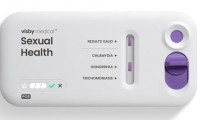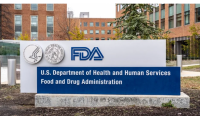-
CRISPR Test Diagnoses Mpox Faster Than Lab-Based PCR Method
- Source: drugdu
- 546
- February 16, 2024
-
Portable Rapid PCR Diagnostic to Detect Gonorrhea and Antibiotic Susceptibility
- Source: drugdu
- 446
- February 16, 2024
-
US lawmakers urge administration to take action against Wuxi
- Source: drugdu
- 258
- February 16, 2024
-
Changing protocol language and site actions are key to making trials inclusive
- Source: drugdu
- 393
- February 16, 2024
-
Millions of people to view digital prescriptions via the NHS app
- Source: drugdu
- 403
- February 16, 2024
-
NHS launches BRCA testing programme for people of Jewish descent
- Source: drugdu
- 361
- February 16, 2024
-
New Stool Test for Detecting Colorectal Cancer Could Reduce Unnecessary Colonoscopies
- Source: https://www.labmedica.com/molecular-diagnostics/articles/294800242/new-stool-test-for-detecting-colorectal-cancer-could-reduce-unnecessary-colonoscopies.html
- 516
- February 15, 2024
-
Simple Blood Test Can Predict Heart Attack Risk within Six Months
- Source: https://www.labmedica.com/molecular-diagnostics/articles/294800241/simple-blood-test-can-predict-heart-attack-risk-within-six-months.html
- 412
- February 15, 2024
-
US Senate committee interrogates big pharma on “outrageously high” drug prices
- Source: https://www.pharmaceutical-technology.com/news/us-senate-committee-interrogates-big-pharma-on-outrageously-high-drug-prices/?cf-view
- 645
- February 15, 2024
-
Hemogenyx gets reprieve as FDA lifts clinical hold on AML CAR-T therapy
- Source: https://www.pharmaceutical-technology.com/news/hemogenyx-gets-reprieve-as-fda-lifts-clinical-hold-on-aml-car-t-therapy/?cf-view
- 541
- February 15, 2024
your submission has already been received.
OK
Subscribe
Please enter a valid Email address!
Submit
The most relevant industry news & insight will be sent to you every two weeks.

















